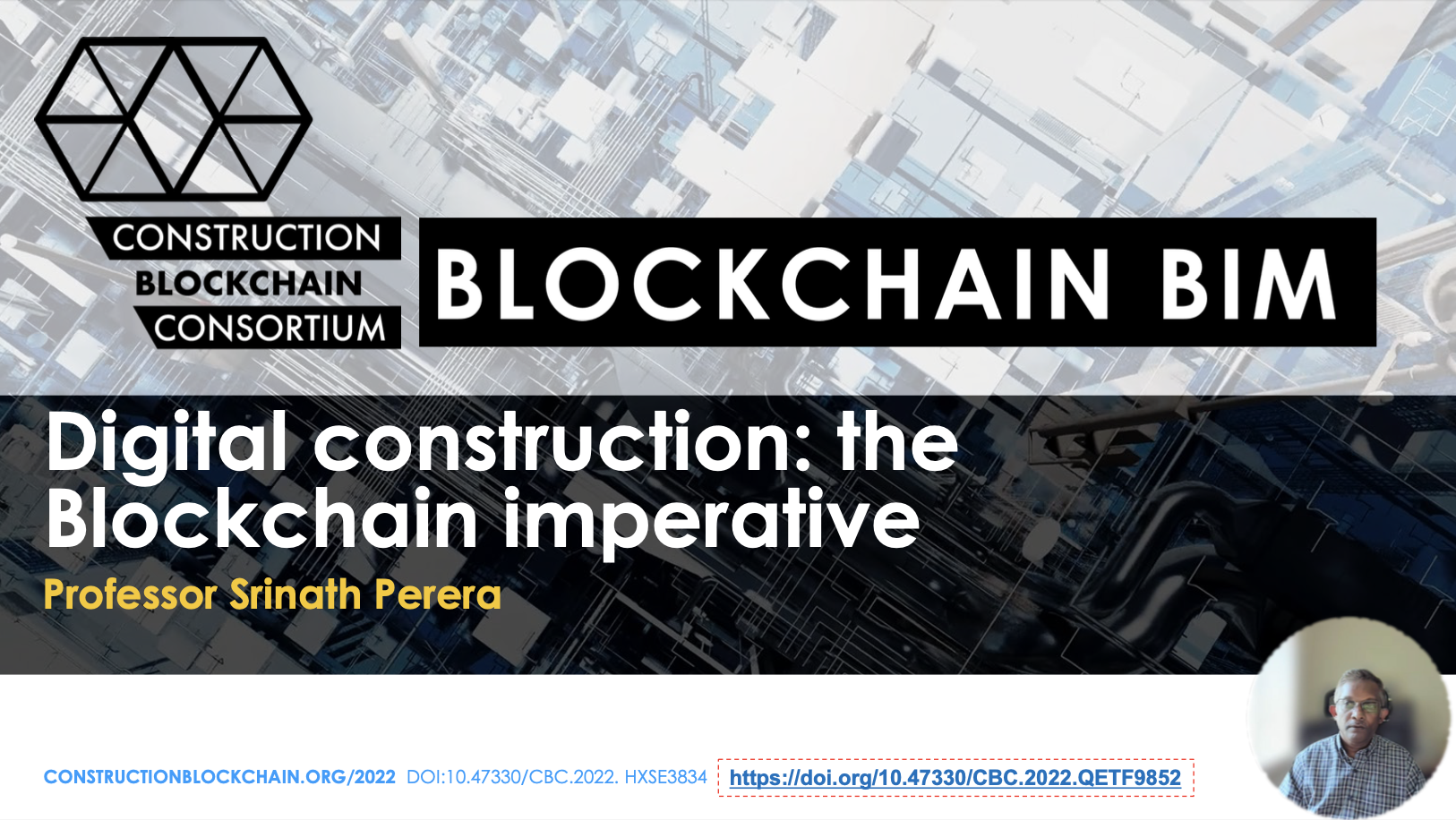Difference between revisions of "Digital Construction: The Blockchain Imperative"
| (4 intermediate revisions by the same user not shown) | |||
| Line 5: | Line 5: | ||
[[Category:Conferences]] | [[Category:Conferences]] | ||
| − | [[CBC 2022]] presentation by [[Srinath Perera]]. https://doi.org/10.47330/CBC.2022.QETF9852 | + | [[CBC 2022]] presentation by [[Srinath Perera]]. https://doi.org/10.47330/CBC.2022.QETF9852 | Watch [[File:VideoRecord-Icon.png |Left|22px|link=https://youtu.be/ZqcdIeUaHMM]] | [[File:Slides-Icon.png |Left|30px|link=https://www.dropbox.com/s/wwddksdcd9k5oqv/CBC2022_S1-1_S-Perera.pdf?dl=0]] |
| − | [[File: | + | [[File:CBC2022_S1-1.png|center|800px]] |
=Abstract= | =Abstract= | ||
| − | + | Digitalisation is a fundamental component of the Industry 4.0. In 2017, Construction Industry is the second least digitalised industry globally. This was the case 10 years back as well and it continues. Construction productivity is again lower than other sectors in comparison thus it is ripe for disruption. A recent study of the New South Wales construction sector found that nearly 60% of the sector is still at a basic level of digital maturity. | |
| − | + | Construction industry is one that utilises extensive and complex supply chains to procure its product; an asset such as a building or structure. Technologies such as Building Information Modelling is driving digital solutions predominantly for the design aspects of construction but procurement still rely on primitive approaches and at most internet base invoicing. Construction procurement is one of the key processes that is least digitalised. This has resulted in many issues such as delay in payments, high cost of finance, defaults in payments, issues of non-compliance, lack of trust between certifiers and builders among others. | |
| − | + | In such an environment Blockchain has been identified as a potential solution for the sectors issues. Blockchain is a digitalised distributed ledger technology that captures and records of all transactions in an immutable manner. It therefore provides the opportunity to enhance and induce digital trust to transacting parties. Blockchain solutions can be implemented in construction supply chains to capture all transactions including payment and work certification creating digital trust between parties. This then will eliminate payment delays and consequent additional cost of finance that is required to supplement delayed payments saving the sector around 30% of costs. | |
| − | + | The Centre for Smart Modern Construction (c4SMC) is in the forefront of developing digital solutions using blockchain technology for the construction sector. These includes its own construction supply chain solution, payment and work certification solution, the platform to integrate BIM and blockchain for giving a supply chain data layer to BIM objects, and embodied carbon estimating methodology using blockchain, waste trading platform using blockchain, Mechanical and Electrical procurement solutions using blockchain, property sector blockchain solution - Landblocks are some of such examples of blockchain applications developed by the Centre. These solutions clearly demonstrate the potential of blockchain as an underlying digital solution for the construction industry for its management of its processes and procurement activities. | |
| − | |||
| − | |||
| − | |||
=Keywords= | =Keywords= | ||
| − | [[ | + | [[Blockchain]], [[Digitalisation]], [[Procurement framework]], [[Supply chain]]. |
| − | |||
| − | |||
| − | |||
| − | |||
| − | |||
| − | |||
Latest revision as of 12:45, 4 April 2023
CBC 2022 presentation by Srinath Perera. https://doi.org/10.47330/CBC.2022.QETF9852 | Watch
Abstract
Digitalisation is a fundamental component of the Industry 4.0. In 2017, Construction Industry is the second least digitalised industry globally. This was the case 10 years back as well and it continues. Construction productivity is again lower than other sectors in comparison thus it is ripe for disruption. A recent study of the New South Wales construction sector found that nearly 60% of the sector is still at a basic level of digital maturity. Construction industry is one that utilises extensive and complex supply chains to procure its product; an asset such as a building or structure. Technologies such as Building Information Modelling is driving digital solutions predominantly for the design aspects of construction but procurement still rely on primitive approaches and at most internet base invoicing. Construction procurement is one of the key processes that is least digitalised. This has resulted in many issues such as delay in payments, high cost of finance, defaults in payments, issues of non-compliance, lack of trust between certifiers and builders among others. In such an environment Blockchain has been identified as a potential solution for the sectors issues. Blockchain is a digitalised distributed ledger technology that captures and records of all transactions in an immutable manner. It therefore provides the opportunity to enhance and induce digital trust to transacting parties. Blockchain solutions can be implemented in construction supply chains to capture all transactions including payment and work certification creating digital trust between parties. This then will eliminate payment delays and consequent additional cost of finance that is required to supplement delayed payments saving the sector around 30% of costs. The Centre for Smart Modern Construction (c4SMC) is in the forefront of developing digital solutions using blockchain technology for the construction sector. These includes its own construction supply chain solution, payment and work certification solution, the platform to integrate BIM and blockchain for giving a supply chain data layer to BIM objects, and embodied carbon estimating methodology using blockchain, waste trading platform using blockchain, Mechanical and Electrical procurement solutions using blockchain, property sector blockchain solution - Landblocks are some of such examples of blockchain applications developed by the Centre. These solutions clearly demonstrate the potential of blockchain as an underlying digital solution for the construction industry for its management of its processes and procurement activities.
Keywords
Blockchain, Digitalisation, Procurement framework, Supply chain.

